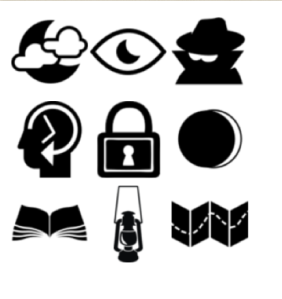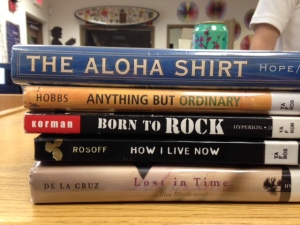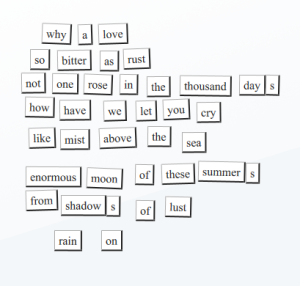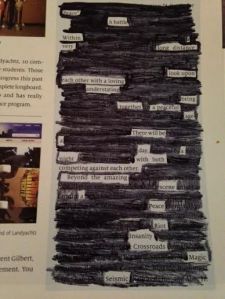https://projeqt.com/preview/17d9fa87794251400864043896f209c7/reneevanbergeijk/tok-ia-2/title-page/l
Author Archives: reneevanbergeijk
Cinemegraph
Music, Memory and Emotion
When I was younger I never actually listened to the radio; it seemed like a childish thing to do. I always liked the silence of the car and that for once everything could be quiet. I also didn’t have cable until I moved into middle school and so television experiences were limited to VHS and DVDs. As a result, my earlier years were comparatively minimally musical. It’s strange to think it, but despite my constant domestic days filled with singing (mostly Disney songs) and aimlessly humming some unrecognizable tune, music did not play a huge role in my life. I’m pretty sure this changed with the addition of cable TV to my life as well as my very first iPod. I went from having nothing to an explosion of so many things all at once that it was overwhelming, so much so that I think it developed in me a certain unwariness, even resentment towards all forms of technology, something I carry with myself even to this day. Regardless, music was born into my life and instantly I realized its power, its insanely influential effect it had me and anybody else. How could a mezcla of sounds like this have such an empowering effect as to instill emotion, memory and frisson within the human body? With our resent viewing of some short clips from the movie Equilibrium, I began thinking of a world without this melodious miracle and I found it really quiet difficult to imagine. I then began to realize how integrated music really is into every part of our life. When was the last time you went into a store and there wasn’t music playing? It is everywhere and even though scientists can begin to explain its everlasting effect that music has on us, I think in some way its power will always and forever be a mystery.
The earliest memory I have of my life is probably the time almost died when I was about the age of two. My mother left me in the car to run in the house and get something. It was on and being such a curious little chillen, I decided to play with the emergency brake, accidentally releasing it. Being a standard, the car then rolled backwards down our drive, turned itself and proceeded to roll down the street. I didn’t get very far as the car soon drifted to hit a policeman’s personal parked car he had just gotten back from the body shop earlier that day. Even though I was only two years old, I remember every detail as if it happened yesterday. I remember feeling my face hit the dashboard and sitting in the car, slightly stunned waiting for someone to come and get me. It’s weird because despite that day, I don’t really have any specific memory of my childhood until I was about three. It’s a strange thing, memory. Due to the name, it seems as though we should be able to remember anything we really wanted to, that’s why its called a memory. Yet our brain is so complex, taking into account our emotions, that it chooses which details to forget and which ones to remember. Kind of smart that way right? I think the greatest thing for me that I can appreciation about memory is the connections that it makes, how it can be so tightly associated with something else. A memory easily connects us with an emotion which connects us with an object, person or place which can lead us to yet another memory and so on. It’s all a system of webs and lines that cross, dip, curve and connect, bringing us closer to and sometimes farther from the only thing we really have, our past.
I find it really easy for me to list out the six most common emotions: happiness, fear, confusion, love, sadness, and anger. There are thousands of others out there, some even that are not associated with any word found in the English language, but rather have to be described using other emotions. Regardless, without a doubt I can tell you what I think are the six most common general emotions are, yet I find it nearly impossible for me to tell you what each of them feels like. How can this be? If emotion is so easily identifiable, how is so difficult to describe? For me personally, I blame experience as the main factor. I can relay to you what happiness is because I have felt undoubted happiness before. Now there may be sometime in the future that I may feel even more happy than I had at this moment of undoubted happiness, but for now I have felt happiness and know what it was I was feeling was indeed happiness. However, I can’t discuss with you what fear feels like. In all of my attainable memory, I cannot find a time when I had felt undeniably fearful. It sounds horrible and I’m sure that I would know when I had felt undeniable fear, yet experience has not granted me this “pleasure”. In a more general sense, we are presented with the explanatory gap when it comes to emotions because in general, emotion varies for each one of us. It is even ridiculous to provide a definition for such an emotion because there is no one meaning, each one of us experience it so differently it’s amazing we can even associate a definite word with a particular feeling. Emotion is so very complicated that even in the movie Equilibrium, the want to eradicate it from the human world is justifiable. Emotion is undefinable, uncontrollable, that its no wonder it can lead to carnage just as much as it can lead to beauty. However, emotion is honestly what makes us variable, differing humans that have collaborated and clashed to create a world that is nothing more than what we have made it to be.
Lifetime Playlist
5×5 Final Vlog
TOK Language IA: Where do new words come from?
Stop Motion Language
SPANISH SLANG WORDS
Picture Poem
Original Poem (no peeking silly goose)
https://docs.google.com/a/lejardinacademy.org/document/d/1HB52bTQC-tYQr3isVANYsdnPkadCkbR9GP6RoUuUq68/edit
Remix of Hanna Deon’s Poem
Original Image:

My Interpretation
A starless night
With such a moon shrouded in clouds
Rather than a beacon of light and guidance
Simply a meaningless dark crescent
And there are eyes everywhere
They come out of the night
Like whispering, shuddering shadows
And begin to turn innocent minds
It is we who are the prisoners
Kept locked as the sun in an ever smaller cage
And still the moon is disappearing
Into the ebony night
So we are kept hidden, hidden from the world
In a place where we can only read our legacy in books
And hope one day a lantern will light our way
So that we may see the map to lead us
REMASH POEM
Language Post
Quotes and Linking Questions
1. “Thought is not merely expressed in words, it comes into existence through them” – L. Vygotsky
I agree with the idea that human thought, the very thing that emphasizes the privacy of our minds, has been born into existence through the expression of words. With the development of a language, humans have been able to explain their ideas, their notions, their beliefs of this world. Language has left the closed door of explanation ajar and allowed us humans to have the ability to tell what it is we see, what we feel, and most importantly, what we know. Without language, our thoughts would be confined to our inner self, and with that, would humans even be able to have thoughts if there was no language to categorized what it was that someone saw, felt or “thought”? We would simply be limited to our five senses, smelling, hearing, tasting, touching or seeing things, but yet have no way of saying what those things were or what it was that made us feel attracted or attracted towards them. In my experience, thought is such a complicated process that even with language, many still have trouble explaining what it is they are thinking. So many times I hear people who have great, even revolutionary, ideas that could score them a golden ticket to enlightenment, however their voice is different from the their thoughts. They fail in communicating, the one concept that language is supposed to make easier to do. And so we see that even though language does permit the expression of thought, there is still such a void between thoughts and verbal explanation that it seems somewhat impossible sometimes that we haven’t communicated a way around it already.
A promo video for a book that looks at the language of emotion: https://www.youtube.com/watch?v=srOijDdNxBc
This video, even though it may be a promo for a book, is a perfect example of how language has allowed us to express our thoughts, specifically our emotions. The man also discusses how body language is also a form of language that has allowed for individual expression and as it relates to understand human relationship, love and lies.
2. Does the way you describe something affect how you feel about it? What is the power of language? What roles do context, emotion, selection, emphasis, and word choice play in language?
Language is powerful and can be used as a tool in order to emphasize or enunciate something important. Language, if used effectively, can even radiate what someone feels, or what emotion they have tied with the focus of their explanation. Language is like the medium, the basis of explanation and the paintbrush uses the medium in order to display what it is that we are feeling. I know personally that the way someone describes something is just as important as what it is they are describing. If the aim is to get another to like or appreciate what it is they are telling you, you tell it in a way that is likable and appreciative. I see this all the times with teachers and I find that there is a relationship between the classes that I really like and the teacher that teaches them. Expression and love for a subject can really carry over unto the person learning it.
When it comes to the specific display of language, context, emotion, selection, emphasis and word choice all play huge roles in language. It is a combination of these five things that are constantly used in every day language that allows one to use language as a tool for understanding. Without context, there is no understanding of the sentence. Without emotion, one does not understand the context. Without selection, many words are just excessive. With emphasis, there is no idea what is supposed to be taken away from the sentence. And without word choice, there is no selection, no emotion and no context of the words proposed.
This article: http://www.goethe.de/lhr/prj/mac/msp/en1253450.htm covers all the aspects of language, highlighting how it can be used and expressed. The article also discusses language around the world, to include bilingualism and identity that language creates.
Blog Questions
1. How much could you know about the world if you had no language or means of communicating with other people?
In a world without language, with no method of verbal communication or way of saying rock, table or hug, we would be left as in the dark as a blind dog at night. There would be no knowledge of the past, no talk of the future. Emotions would be confined to the body and expression be silent. There would be no explanation, no questions asked. One would be trapped within the mind, with no word to describe that fluid blue mass that made ones skin feel slimy and chilled. The world to you would be simply visual, with no meaning, connotation or memory associated with what it was you saw. To us, language is everything, it is the core of our existence and if communication was nonexistent, something so out of reach that even body language was unheard of, we would simply exist, as blind, deaf or disabled as ever, with no reason, no growth and no involvement. Ultimately without language, we as humans would have ceased to exist ages ago.
2. How would you try to explain to a blind person what the word RED means? What does this suggest to you about the limitations of definitions?
To a blind person I would say, red is fire, it is heat and warmth. A feeling so strong and so intense that it verges on the sensation of choking, of being weighed down by an unfathomable depth. Red is what you feel towards a person who cares for you, someone who within their voice you can hear their interest and care, their trust and love. It is the color of embarrassment, the sense you get when a room goes quiet and you are instinctually aware, regards of how blind you are, that there are eyes set hard and judging on you. When you feel pain, sharp and hot, that is red, filling you with worry and dread and you think to yourself just how lucky you are that your eyes are not present to play witness. Red is powerful and profound, there is honestly nothing quite like it.
When it comes to describing the feelings, concepts or ideas that are associated with red, this is where our language provides an explanation like no other. However if instead, one wishes to describe the actual physical characteristics of the color red we stumble upon the impassable gorge, or canyon which is the explanatory gap, something our language, despite how advanced and developed it may be, has been unable to build a bridge to cross. To describe red is to instead highlight the limitations that our language and limit defining something that is so simple and understandable to most.
3. Birds fly and planes fly. Since fish swim, why don’t we say that submarines also swim? What do submarines do?
An interesting perk of our forever strange form of language, I cannot say why it is that we do not associate submarines with swimming even though their animal counterparts, whales, sharks and fish do swim. It is a curious thing. I personally would say that submarines “cruise”, similar to the way that planes can “cruise” and missiles can “cruise”. However, why it is that we say aerial objects and life fly, while not saying both aquatic life and objects swim is something we may never quite comprehend. Similar to the way we call football soccer when it is a game obviously played with your feet, and even though the rest of the world calls it football, our version is a game played with your hands. It is a peculiarity of our language that may be written in stone and never be translated.
4. What can or have you learned about your own language by studying a second language? can you provide examples from your second language which have no English equivalent? What about idioms (expressions)?
By studying Spanish for six years now I can say with certainty that English is a strange language. Especially compared to all the other European languages that are present, English is quite different. For one, we often times have the same word for four different meanings, and to top it off, often times the word is spelled the same whether you mean it one way or not. For example the word drive in the English language is used to express the physical act of driving, a car or bus, and it can also be used to say in the way that someone has drive, as in they have determination to get something finish. In Spanish however, to drive (a car) is expressed by the word manejar, while drive (as in determination) is written as empuje. It seems to us as English speakers that this is simply a waste of breath to have so many different version of the same word all meaning different things. However it actually does make sense when you think about it because without different words for different meanings, one has to rely on context and emotion to express which type of the word is being used.
Then there are those moments where there are words that are specific to one language and cannot be translated into English or vice versa. For example the word paturienta has no direct English translation, but it is used to describe a woman in labor or a woman who has just given birth. And to give you a word from our end, the word “wit” has no direct Spanish translation, but instead the word ingenio is used which directly means ingenuity.
The Spanish language does have some pretty interesting “idiomaticas” or idomatic phrases as well.
“Para el carro” literally means stop the car in Spanish, but is the same as saying “hold you horses” in English.
“Andar como burro sin mecate” literraly means “to walk like a donkey without a leash”, but is the same as saying someone is wild or out of control in English
“Ojos que no ven, corazon que no siente” literally means “eyes that don’t see, heart that does not feel”, but it is the equivalent to saying “out of sight, out of mind” in English.
5. Take 2 advertising slogans of your choice – such as “Just Do It” by Nike- explain why you think they are effective (or not)
SUBWAY Eat Fresh
The notorious subway’s “Eat Fresh” is a slogan we hear of almost everyday. It is used to help us believe that what Subway serves in their sandwiches is nothing but fresh ingredients and that by consuming their sandwiches we in turn are “eating fresh” and living a healthy life. This idea of eating fresh is tied in with the notion that instead of eating foods that are fried and dipped in oils and salts, one is consuming a sandwich that is good and nutritious as something one would make in their own kitchen. It is a powerful slogan and I think it is quite effective on many as they are tricked into believing that a sandwich is fresher and more advantageous for ones health and therefore, a better option for lunch than “fast food” is.

APPLE Think Different
Apple’s slogan was revolutionary in changing the world of technology as it encouraged people to step out of the norms of society and break out of the confinements of the box. To “think different” was to be weird, be wild, be crazy and “out of one’s right mind”. In a way, to create such revolutionary devices and inventions that have changed the world of technology, Apple has harnessed this modernistic idea of being a maverick, one who is special and unique in every way possible. That none of us are the same at all and that we are different stars constructing the endless cosmos that stretch on with endless possibilities. To think different is to be unexplainable and to be remembered through all of time. This slogan is so effective because as humans we strive to be different, we strive to be remembered as the blue flower in a field of roses, as the one who was wild and uncontrollable, but who’s legacy lives on, never forgotten.

6. In 1947 the U.S. Department of War was renamed the Department of Defense. Do you think this makes a difference? Explain.
I think the change in name makes a huge difference all because of one word. War has a very negative connotation to it. It seems as the “initiator” and puts off the idea that war is always inevitable. However, by changing war to defense, it makes it seem to be more innocent that we are simply defending rather than advancing and initiating the conflict we are instead keep just our people safe.
COMMENT ON THE FOUR VIDEOS
1. STEPHAN FRY’S: FRY’S PLANET WORD
Fry makes a real interesting point in response to the question proposed why we have so many different languages in the word. He says that one of the oldest myths is that it was God’s doing to destroy the original language of Adam and Eve and split the people into many different tribes who all spoke different languages so that there were no ways to communicate with each other. He also discusses how quickly many of the world’s languages are disappearing so rapidly from existence and that in 40 years there may be only 700 left. Fry suggests that many may think this is enough, but he goes on to elaborate that with each language is the history and culture of this world that constructs the diversity and geographical differences within countries.
2. WHERE DO SWEAR WORDS COME FROM?
Stephan Fry discusses English swear words and how they are somewhat of paradoxes in themselves. Most of our swear words are in relation to “love” or showing “affection” and in a way these are the beautiful things to experience within a human life yet we use these words with such a negative connotation. However with words like torture, murder or suicide, these aren’t considered cuss words even though they describe some of the worst possible things that occur in this world.
3. TWITTERATURE?
This video discusses the “rules” of sites like twitter and how this idea of constraint is what has and does foster creativity. In fact, the video discusses how people are uses Twitter and other social media to write works of art like stories or poems. I really agree with the about the relationship between constraint and creativity and I find this so interesting because from personal experienced, when I am put under restraints, I tend to open my mind to think of all the possibilities to solve the problem.
4. BIRTH OF A WORD
An interesting talk, Deb Roy discusses how his learned his first words and what components were involved in the learning process. He interestingly discusses how social interactions affect when and how quickly a word was learned as well as the occurrence of a word compared to when the child learned to say it.






